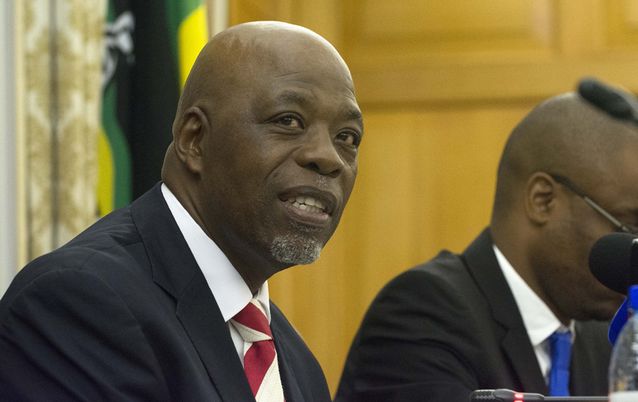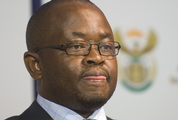Duties of ANC’s chief whip clarified
by Ben Turok,
2016-03-18 06:30:01.0
THE resignation of Stone Sizani from his position as African National Congress (ANC) chief whip has led to much discussion. It has also revealed that the government has not done enough to explain the nature of our parliamentary democracy to either the media or ordinary people.
The job description of the chief whip personifies the kind of democracy we have created. The chief whip is the official voice of the ruling party in Parliament and an ex-officio member of the national executive committee of the ANC.
He or she is in constant touch with the secretary-general and must reflect ANC policy broadly. At the same time, the chief whip has to respect Parliament as an independent multiparty institution with its own traditions. The chief whips of the ruling and opposition parties meet weekly to decide on the workings of Parliament, to arrange debates and schedules, and many other matters.
This is where many compromises are made — compromises without which Parliament could not function. It is a myth that the ruling party’s majority means it can go it alone in our multiparty system.
The power base of the chief whip in Parliament is the ANC caucus, which consists of all ANC MPs, including the Cabinet and members of the National Assembly and the National Council of Provinces. The caucus meets every Thursday.
The chief whip may appoint an MP to chair caucus meetings, but he or she prepares the agenda and makes presentations. Caucus can be quite obstreperous. It provides members the opportunity to challenge a minister, to disagree on matters of policy, and even to oppose a bill. On occasion, the president will want to address caucus, and the chief whip is expected to manage the discussion. Above all, the chief whip has to exercise leadership over a large gathering of people with strong personalities.
The chief whip must also work with the deputy president, as the leader of government business, to manage the passage of bills. It is his or her job to ensure that Parliament is quorate: in the National Assembly, 201 of 400 MPs must be present when a vote is taken on a bill. Of the 249 ANC MPs, about 70 are ministers and deputy ministers whose work often keeps them away from Parliament. Every portfolio committee in Parliament also has its own whip. The whips, who are appointed by and report back to the chief whip, run portfolio study groups. The chief whip also recommends members to the ANC deployment committee to serve as chairs of these committees.
The chief whip can influence the content of speeches in the house through the strategy meetings that take place prior to any debate. Any prospective speaker has to appear before a group of whips and broadly set out the line of their speech for approval. In most cases, speakers are selected by the relevant study group, but for major policy debates, it is the chief whip who makes the selection.
The chief whip is also responsible for the discipline of ANC MPs, including their attendance at debates and committees, and must deal with the media, especially when there is a crisis. From time to time, the chief whip will discuss problems with the speaker of the house.
The South African parliamentary system, like that of most parliaments in the world, is based on the UK’s Westminster model. The arrangements are often untidy, laborious and inefficient. Ultimately, it all depends on all parties agreeing to co-operate to pass laws in the national interest. While plenary sessions often become noisy and even unruly, with MPs grandstanding for TV, there is generally an undercurrent of goodwill.
The serious work of Parliament is done in the portfolio committees. Here, compromise is easily reached when the issues are not overly contentious. But if there is a breakdown in committee work, the chief whip will investigate and may remove a recalcitrant member.
The role of chief whip requires a person of wisdom and good judgment who can get on with people with strong views and exercise leadership at all times.
• Prof Turok is a former ANC MP.

Stone Sizani. Picture: TREVOR SAMSON
THE resignation of Stone Sizani from his position as African National Congress (ANC) chief whip has led to much discussion. It has also revealed that the government has not done enough to explain the nature of our parliamentary democracy to either the media or ordinary people.
The job description of the chief whip personifies the kind of democracy we have created. The chief whip is the official voice of the ruling party in Parliament and an ex-officio member of the national executive committee of the ANC.
He or she is in constant touch with the secretary-general and must reflect ANC policy broadly. At the same time, the chief whip has to respect Parliament as an independent multiparty institution with its own traditions. The chief whips of the ruling and opposition parties meet weekly to decide on the workings of Parliament, to arrange debates and schedules, and many other matters.
This is where many compromises are made — compromises without which Parliament could not function. It is a myth that the ruling party’s majority means it can go it alone in our multiparty system.
The power base of the chief whip in Parliament is the ANC caucus, which consists of all ANC MPs, including the Cabinet and members of the National Assembly and the National Council of Provinces. The caucus meets every Thursday.
The chief whip may appoint an MP to chair caucus meetings, but he or she prepares the agenda and makes presentations. Caucus can be quite obstreperous. It provides members the opportunity to challenge a minister, to disagree on matters of policy, and even to oppose a bill. On occasion, the president will want to address caucus, and the chief whip is expected to manage the discussion. Above all, the chief whip has to exercise leadership over a large gathering of people with strong personalities.
The chief whip must also work with the deputy president, as the leader of government business, to manage the passage of bills. It is his or her job to ensure that Parliament is quorate: in the National Assembly, 201 of 400 MPs must be present when a vote is taken on a bill. Of the 249 ANC MPs, about 70 are ministers and deputy ministers whose work often keeps them away from Parliament. Every portfolio committee in Parliament also has its own whip. The whips, who are appointed by and report back to the chief whip, run portfolio study groups. The chief whip also recommends members to the ANC deployment committee to serve as chairs of these committees.
The chief whip can influence the content of speeches in the house through the strategy meetings that take place prior to any debate. Any prospective speaker has to appear before a group of whips and broadly set out the line of their speech for approval. In most cases, speakers are selected by the relevant study group, but for major policy debates, it is the chief whip who makes the selection.
The chief whip is also responsible for the discipline of ANC MPs, including their attendance at debates and committees, and must deal with the media, especially when there is a crisis. From time to time, the chief whip will discuss problems with the speaker of the house.
The South African parliamentary system, like that of most parliaments in the world, is based on the UK’s Westminster model. The arrangements are often untidy, laborious and inefficient. Ultimately, it all depends on all parties agreeing to co-operate to pass laws in the national interest. While plenary sessions often become noisy and even unruly, with MPs grandstanding for TV, there is generally an undercurrent of goodwill.
The serious work of Parliament is done in the portfolio committees. Here, compromise is easily reached when the issues are not overly contentious. But if there is a breakdown in committee work, the chief whip will investigate and may remove a recalcitrant member.
The role of chief whip requires a person of wisdom and good judgment who can get on with people with strong views and exercise leadership at all times.
• Prof Turok is a former ANC MP.
























Change: 1.19%
Change: 1.36%
Change: 2.19%
Change: 1.49%
Change: -0.77%
Data supplied by Profile Data
Change: -0.19%
Change: 0.69%
Change: 1.19%
Change: 0.00%
Change: 0.44%
Data supplied by Profile Data
Change: -0.01%
Change: 0.19%
Change: 0.49%
Change: 0.66%
Change: -0.12%
Data supplied by Profile Data
Change: -0.26%
Change: -0.41%
Change: 0.19%
Change: 0.00%
Change: -0.44%
Data supplied by Profile Data